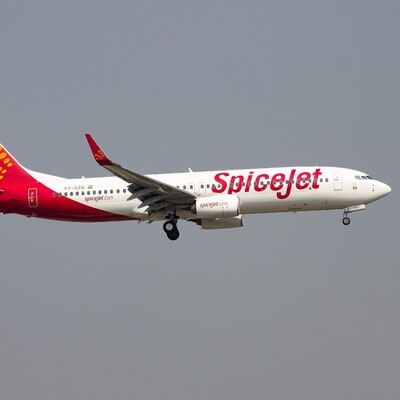Budget airline SpiceJet on Tuesday revealed that it did not pay statutory dues amounting to Rs 427 crore between March 2020 and August 2024 due to its “constrained financial position”. The unpaid dues include Rs 219.8 crore in tax deducted at source (TDS), Rs 71.33 crore in goods and services tax (GST), and Rs 135.47 crore towards provident fund (PF) contribution.
The cash-strapped airline also disclosed that 36 of its 58 aircraft are grounded, “primarily” due to “alleged default” in payments to aircraft lessors, financial difficulties affecting aircraft maintenance, and the unavailability of components and spare parts.
These revelations were part of SpiceJet’s preliminary placement document, submitted to the BSE to raise up to Rs 3,000 crore through a qualified institutional placement (QIP) process at a floor price of Rs 64.79 per share.
Legal experts told Business Standard that failing to remit GST is a serious offence because the tax has already been collected from customers but not paid. Non-payment of GST might be treated as a criminal offence and could lead to a minimum 60-day jail term, they said. Unpaid TDS, however, can be paid later with interest.
“Penal provisions are strict. Some of these are taxes which have been collected and need to be paid, such as the GST. These cannot be pocketed by the company,” said Abhishek Rastogi, founder of Rastogi Chambers.
Subhash Chandra Garg, former finance secretary, highlighted the potential legal consequences, noting that penalties and interest could be imposed on those responsible. “There are provisions of imposing penalties and interest costs, and also taking action against key management (personnel) responsible for it (such infractions). I suppose the central authority of GST would have initiated the action whenever dues were not paid.”
In addition to the statutory dues, SpiceJet revealed that it owed Rs 118.9 crore to its employees as on September 15, 2024, which it plans to clear using funds from the QIP. The airline’s airport dues stood at Rs 290 crore as on September 15, of which Rs 150.3 crore shall be settled from the money raised. It also intends to allocate Rs 370 crore to expand its fleet.
Ajay Singh, SpiceJet’s promoter, and related entities hold a 47.01 per cent stake in the airline. Shares of SpiceJet declined 5.23 per cent to close at Rs 73.72 apiece on the BSE on Tuesday.
SpiceJet admitted there are further “disputed” statutory dues from previous years, including service tax, TDS, GST, and Customs duties. Of the QIP proceeds, Rs 601.5 crore will be used to settle statutory dues, Rs 750 crore will go towards clearing liabilities to lessors and vendors, and Rs 410 crore will be spent on maintaining and “ungrounding” aircraft and to buy spare parts.
SpiceJet did not immediately respond to Business Standard’s queries on this matter.
Ameya Joshi, an aviation researcher and founder of aviation blog Network Thoughts, commented: “Statutory compliance is negative, but SpiceJet can overcome this issue unless authorities bar the airline from conducting flight operations.” However, any large entity investor looking to invest in SpiceJet may wonder about the possibility of these issues recurring, Joshi said.
The airline in its filing mentioned about the resignation of its former chief financial officer, Ashish Kumar, in July, and said a replacement has yet to be found.
As on June 30, 2024, SpiceJet employed 7,824 full-time staff but reported negative retained earnings (or accumulated deficit) of Rs 7,728 crore and a negative net worth of Rs 5,022 crore. “We have incurred liability on account of alleged delays in repayment/non-payment to our creditors, inability to comply with the terms of leasing arrangements, non-payment of statutory dues, and irregularity in complying with the regulations or guidelines,” it mentioned.
“If a company fails to make Provident Fund (PF) payments under the Employees’ Provident Funds and Miscellaneous Provisions Act, 1952, it faces penalties including interest on the delayed payment, damages up to 100% of the unpaid amount, and legal action. The company’s responsible officers may also face imprisonment for up to 3 years, along with fines, if the default is willful. Persistent non-payment can also lead to prosecution by the Employees’ Provident Fund Organization (EPFO),” says Mukesh Chand, senior counsel and head of banking and IBC practice at legal firm Economic Laws Practice.
It further noted that there have been instances of notices, warnings and action being initiated against the airline on account of certain lapses in regulatory compliances. “For instance, the DGCA (Directorate General of Civil Aviation) has put us on enhanced surveillance on August 24, 2024, pursuant to their audit findings. In this regard, we may be subject to penalties and regulatory actions including suspension of our business operations,” it added.
Sonam Chandwani, a partner at KS Legal & Associates, noted that the airline could face legal challenges over unpaid dues and operational difficulties. “Lessors and lenders could approach the National Company Law Tribunal (NCLT) and other legal forums to recover their dues. Additionally, the government might start exerting pressure for recovery, along with lenders and lessors. SpiceJet will need to take immediate steps to negotiate and raise funds to avoid further escalation,” she said.
Last month, the cash-strapped airline announced it had temporarily furloughed 150 cabin crew members for three months due to a “lean travel season”, a reduced fleet, and for the “long-term stability of the organisation”. The airline has struggled with losses for the past six years and has faced challenges in paying staff salaries.
First Published: Sep 17 2024 | 8:10 PM IST
